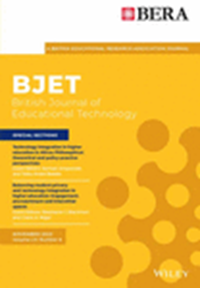Rethinking internationalisation at a distance from the perspectives of international students: Critical reflection towards epistemic justice
Abstract
This qualitative case study examines the concept of ‘internationalisation at a distance (IaD)’ by investigating the learning and academic socialising experiences of international students in online higher education (HE). Amid the evolving landscape of global HE, the COVID-19 pandemic has accelerated the adoption of distance education, creating a unique context for internationalising HE at a distance. The number of international students joining foreign universities from their home countries through the medium of online learning has continued to grow. To better understand IaD from the vantage point of international students, not of universities or domestic students, the present authors listen to online international students, shedding light on the complex nature of being international students in such social and cultural contexts. Qualitative data were collected through in-depth interviews with 19 international students of Chinese ethnicity residing in China while studying and pursuing undergraduate and postgraduate degrees offered by universities in English-speaking countries. Our findings reveal that despite the institutional rhetoric which promotes diversity and inclusivity, especially during student recruitment and induction, online international students experience that their unique cultural perspectives and pedagogical knowledge are usually not accepted, accommodated and welcomed by their programmes, tutors and peers. Nevertheless, like their domestic counterparts, international students are proactive in navigating and shaping their online learning environments and relationships to effectively serve their own learning needs and interests. The outcomes challenge stereotypical narratives of international students prevailing in HE literature and create much more realistic discourses of the democratising potential of international online HE beyond the diversity rhetoric. The findings have been analysed using the theoretical framework of epistemic injustice, hoping to contribute to the IaD research and practices by challenging and reshaping the often uncritical and colonial perspectives on international online students.
Practitioner notes
What is already known about this topic
- Internationalisation in higher education is typically categorised into internationalisation abroad (IA), internationalisation at home (IaH) and internationalisation at a distance (IaD). These concepts have been widely used and interpreted from the perspective of universities as the main actors in internationalisation efforts.
- IaD is defined as internationalisation that occurs within a technology-mediated environment where students, teachers and institutions are located in different locations. It transcends the geographical distinction between IA and IaH and emphasises the virtual mobility of knowledge.
- IaD raises a series of discussions about the identification of international students, especially due to the ambiguous line between ‘international’ and ‘home’ categorisations.
What this paper adds
- This paper reconceptualises IaD from international students' perspective, using ‘home’, ‘hosts’ and ‘guests’ as metaphors to investigate the students' lived experiences of IaD.
- This paper reveals the unequal power relationships and epistemic injustices embedded in and constructing international students' IaD experiences.
- This paper demonstrates the diversity within the international student population, showing them as active agents to employ different strategies to navigate epistemic injustices and challenges in the IaD contexts.
Implications for practice and/or policy
- Institutions should re-examine their internationalisation strategies (abroad, at home or a distance) to achieve diversity and inclusivity principles beyond superficial and numeric measures, avoiding viewing international students merely as tools or resources for internationalisation.
- There is a pressing need to rethink the concept of IaD from the student's perspective and better conceptualise the notion of international students in IaD research and practice.
- Diversity among international students should be taken more seriously in educational practices, and stereotypes and prejudice against specific groups of international students should be addressed further.




 求助内容:
求助内容: 应助结果提醒方式:
应助结果提醒方式:


